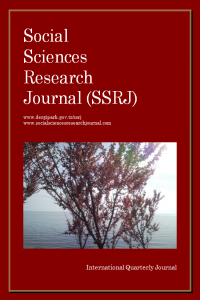Avrupa Birliği’nin Ekonomik Krizi ve Kimlik Krizi
Bu makalede, 2008’deki global ekonomik krizin Avrupa’ya yansımasıyla başlayan Avrupa ekonomik krizinin Avrupa Birliği’nin siyasi geleceğine yansımaları tartışılarak, Avrupa Birliği’nin aynı zamanda yükselen bir kimlik kriziyle de karşı karşıya olduğu öne sürülecektir. Avrupa Birliği’nin 2004 ve 2007’de gerçekleşen Orta ve Doğu Avrupa’ya doğru genişlemesi sonrası ‘genişleme yorgunluğu’ devam ederken, Avro bölgesinde yaşanan borç krizinin Avrupa Birliği içindeki merkez-çevre ve kuzey-güney ayrımlarının daha da belirginleşmesine yol açtığı belirtilerek, zaten muğlak olan Avrupa kimliğinin yeni bir ‘kritik dönüm noktası’ndan geçmekte olduğu vurgulanacaktır., Bu çerçevede, Avrupa Birliği ülkelerinde ve Türkiye’de görülen Avrupa şüpheciliğindeki artış, ve Avrupa Birliği’nin ekonomik krizi ve artan kimlik krizinin Türkiye’nin Avrupa Birliği üyelik sürecine yansımaları incelenecektir.
Anahtar Kelimeler:
Avrupa Birliği, Ekonomik Kriz, Avrupa kimliği, Türkiye.
Economic Crisis and Identity Crisis of the European Union
In this article the influences of the economic crisis, which started with the reflection of the global economic crisis in 2008 on Europe, on the political future of the European Union will be discussed and it is argued that European Union is meanwhile facing with rising identity crisis too. After the enlargements towards the Central and Eastern Europe in 2004 and 2007, while ‘enlargement fatigue’ is still going on, it is argued that the debt crisis in the Eurozone increases the gap between centre and periphery, and northern and southern Europe. Moreover, it is emphasized that, European identity which has been already fuzzy, has been passing through another ‘critical juncture’. In this context, the rise of Euroscepticism, both in the member states and Turkey and the reflections of the economic crisis and rising identity crisis of the European Union on Turkey’s accession process to the European Union will be analysed.
Keywords:
European Union, Economic Crisis, European identity, Turkey,
___
- Arısan Eralp, N. (Ocak 2014). Türkiye- Avrupa Birliği İlişkilerinin Geleceğine Bakış. Türkiye Ekonomi Politikaları Araştırma Değerlendirme Notu. (TEPAV)
- Boomgaarden, H. G., A.R.T. Schuck, M. Elenbaas ve C.H. De Vreese. (2010). Mapping EU Attitudes: Conceptual and Empirical Euroscepticism European Union Politics, 12(2): 241- 266. of EU Support.
- Cameron and Merkel Enjoy Cosy Fireside Chat on the Future of Europe. The Guardian, 7 Haziran 2012.
- De Vreese, C.H., H.G. Boomgaarden ve H. Semetko (2008). Hard and Soft: Public Support for Turkish Membership in the EU. European Union Politics, 9(4): 511-530.
- Dinç, C. (Kış 2011). Avrupa Kimliği: Çatışan Değerlendirmeler Akademik Bakış, 5(9): 31-58. Güncel ve Endişeler.
- Fuchs, D. (2011). Cultural Diversity, European Identity and Legitimacy of the EU: A Theoretical Framework, D. Fuchs ve Hans-Dieter Klingemann (der.), Cultural Diversity, European Identity and the Legitimacy of the EU, Cheltenham, UK: Edward Elgar.
- Göl, A. (2009). The Identity of Turkey: Muslim and Secular. Third World Quarterly, 30(4): 795-811.
- Guibernau, M. (2011). The Birth of a United Europe: On why the EU has Generated a ‘Non-Emotional Identity’. Nations and Nationalism, 17(2): 302- 315.
- Held, D. (7 Şubat 2014). Touching the Fuzzy http://en.theeuropean.eu/david- held/7981-european-identity-a-way-of- solving-problems (17 Nisan 2014).
- Hobolt, Sara B. (2014). Ever Closer or Ever Wider? Public Attitudes towards Further Enlargement and Integration in the EU. Journal of European Public Policy, 21(5): 664-680.
- Kaelberer, M. (Nisan 2004). The Euro and European Identity: Symbols, Power and the Politics of European Monetary Union. Review of International Studies, 30(2): 161-178.
- Kaina, V. ve I. P. Karolewski. (2009). EU Governance and European Identity. Living Governance, 4(2). in European
- Kühnhardt, Ludger (der.). (2009). Crises in European Integration: Challenges and Responses, 1945-2005, New York: Berghahn Books.
- Öniş, Z. ve M. Kutlay. (Bahar 2012). Ekonomik Parçalanmışlık Paradoksu: Avro Krizi ve Avrupa Birliği’nin Geleceği”, Uluslararası İlişkiler, 9(33): 3-22.
- Paterson, William E. (2011). The Reluctant Hegemon? Germany Moves Centre Stage in the European Union. Journal of Common Market Studies, 49: 57-75.
- Risse, Thomas. (5 Mart 2014). Be Tenacious and Fight . The European.eu, http://en.theeuropean.eu/thomas- rissen/7985-european-identity-already- exists (24 Mayıs 2014).
- Risse, T. (2003). The Euro between National and European Identity. Journal of European Public Policy. 10(4): 487- 505.
- Schmidt, Vivien A. (2009). Re-envisioning the Democracy, Economy. Journal of Common Market Studies, 47: 17-42.
- Schmidt, V.A. (2006). Democracy in Europe: The EU and National Polities, Oxford: Oxford University Press.
- Schimmelfennig, F. (2014). European Integration in the Euro Crisis: The Limits of Postfunctionalism. Journal of European Integration, 36(3): 321-337.
- Schimmelfennig, F. (2009). Entrapped Again: The Way to EU Membership Negotiations with Turkey. International Politics, 46(4): 413-431.
- Serricchio, Fabio, Myrto Tsakatika ve Lucia Quaglia. (2013). Euroscepticism and the Global Financial Crisis. Journal of Common Market Studies, 51(1): 51- 64.
- Toplak, Cirila ve Irena Sumi. (Mart 2012). Europe(an Community in the Making?. Journal of Contemporary European Studies, 20(1): 7-28. Imagined
- Yayın Aralığı: Yılda 4 Sayı
- Yayıncı: Denta Florya ADSM Limited Company
